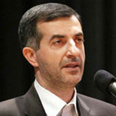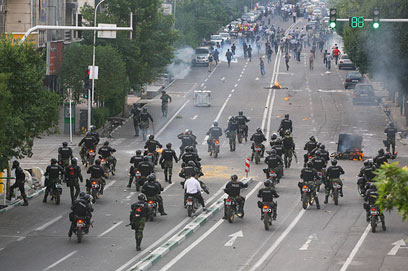
Presidential hopeful Mashaei
US to support free election in Iran
Official says Washington does what it can 'to encourage voices in Iran to press for kind of freedom, fair election that Iranian people deserve,' including keeping access to cell phones, computers; Obama administration reiterates it takes 'no sides in Iran's presidential election'
US officials Wednesday slammed a campaign of "unrelenting repression" ahead of Iran's presidential elections, and said the outcome would be very hard to predict amid a secret vetting process.
The future direction the next Iranian leadership will take in ongoing talks with world powers about the Islamic republic's suspect nuclear program was also difficult to predict, top US administration officials told US lawmakers.
Related stories:
- Next Iran president likely to have gentler touch
- Report: Ahmadinejad may face 74 lashes over election ‘violation’
- Iran presidential candidate blasts Ahmadinejad's Holocaust denial
"There are probably some candidates who would be perceived by us as more interested in looking at the nuclear negotiations in a more positive vein," under secretary of state Wendy Sherman said.
"However the nuclear file is held by the supreme leader and no one else, and he is the final decision maker regarding the nuclear file."

Riots after 2009 elections (Photo: Permerz Hashemi)
The race for Iran's highest elected office took a stunning turn at the weekend when former president Akbar Hashemi Rafsanjani and top nuclear negotiator Saeed Jalili officially registered for the June 14 election.
President Mahmoud Ahmadinejad is constitutionally barred from seeking a third consecutive term. But on Saturday he endorsed his controversial aide and ex-chief of staff Esfandiar Rahim Mashaei.
Jalili, a known hardliner, is close to Iranian supreme leader Ayatollah Ali Khamenei, and was Wednesday in Istanbul for a new round of talks with EU foreign policy chief Catherine Ashton.
But the final line-up of presidential candidates will not be known until later this month when Iran's Guardians Council releases the approved list of names after the vetting process.
'Unrelenting level of repression'
Denouncing "a deliberate and unrelenting level of repression in the lead-up to these elections," Sherman told the Senate Foreign Relations committee that the council was "using vague criteria to eliminate potential candidates."
She also warned that the "green movement" which took to the streets against Ahmadinejad's disputed re-election in 2009 was now "virtually... nonexistent as an organized force inside of Iran."
The massive street protests led to a heavy-handed regime crackdown and the arrest of hundreds of journalists, activists and reformist supporters.
"The repression, the killings, the efforts to close down any possibility to organize has really depressed that capability," she added, highlighting however that the United States was doing what it could "to encourage voices in Iran to press for the kind of freedom and fair election that Iranian people deserve."
That included such things as making sure technology was not jammed to keep access to cell phones and computers open, as well as sharing information on the US's virtual embassy in Iran.
But the outcome of the election was hard to gauge, stressed Sherman, who leads the US negotiating team at the nuclear talks with world powers.
"As you may recall in 2009, everyone thought Ahmadinejad was going to be one kind of leader and he's turned out to be quite another kind of leader," she said.
"We take no sides in Iran's presidential election," Sherman insisted. "The decision about who leads Iran is for the Iranian people, who should have every opportunity to express freely and openly their opinions, ideas, and hopes for the future of their country."
- Receive Ynetnews updates directly to your desktop










